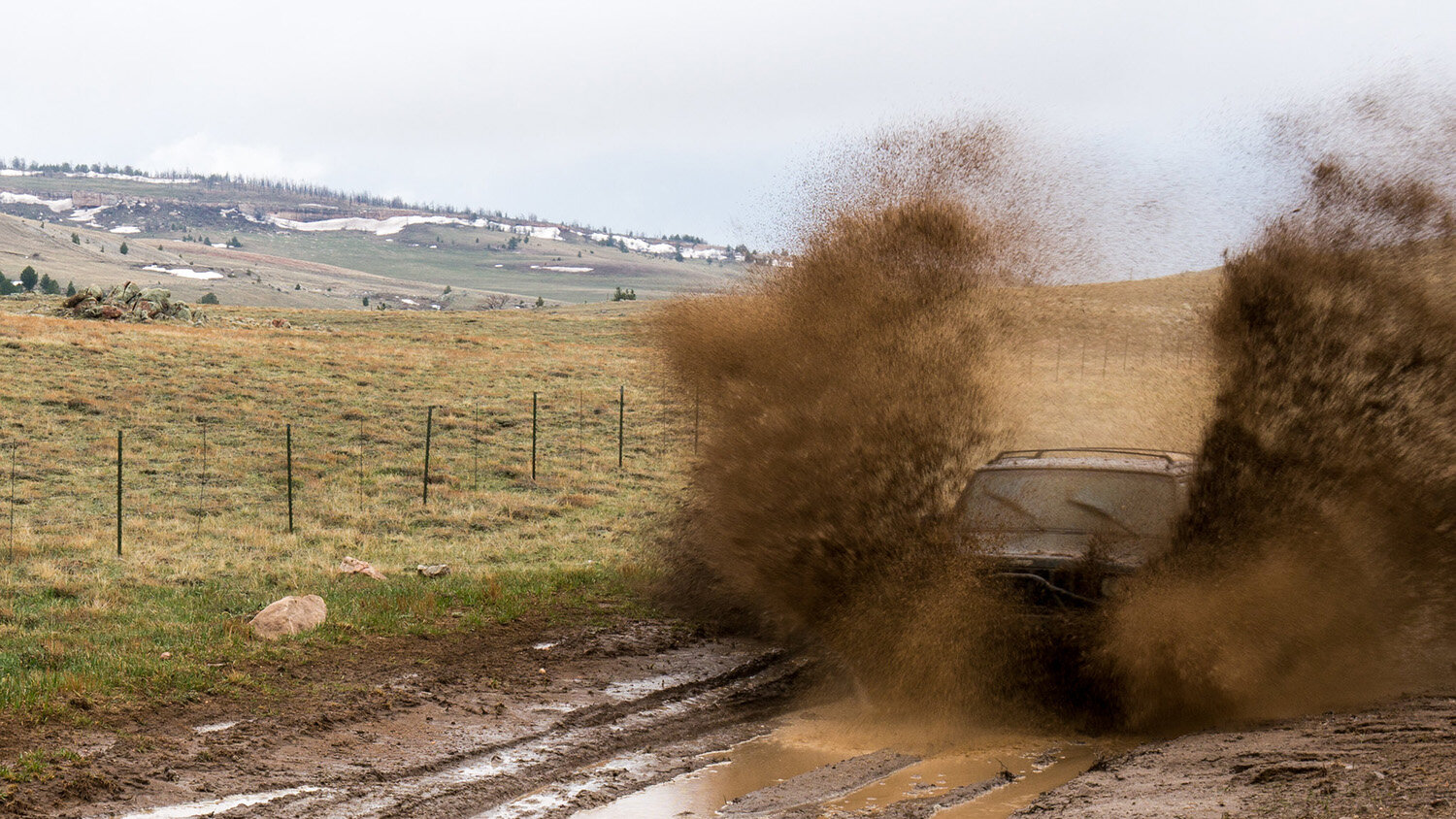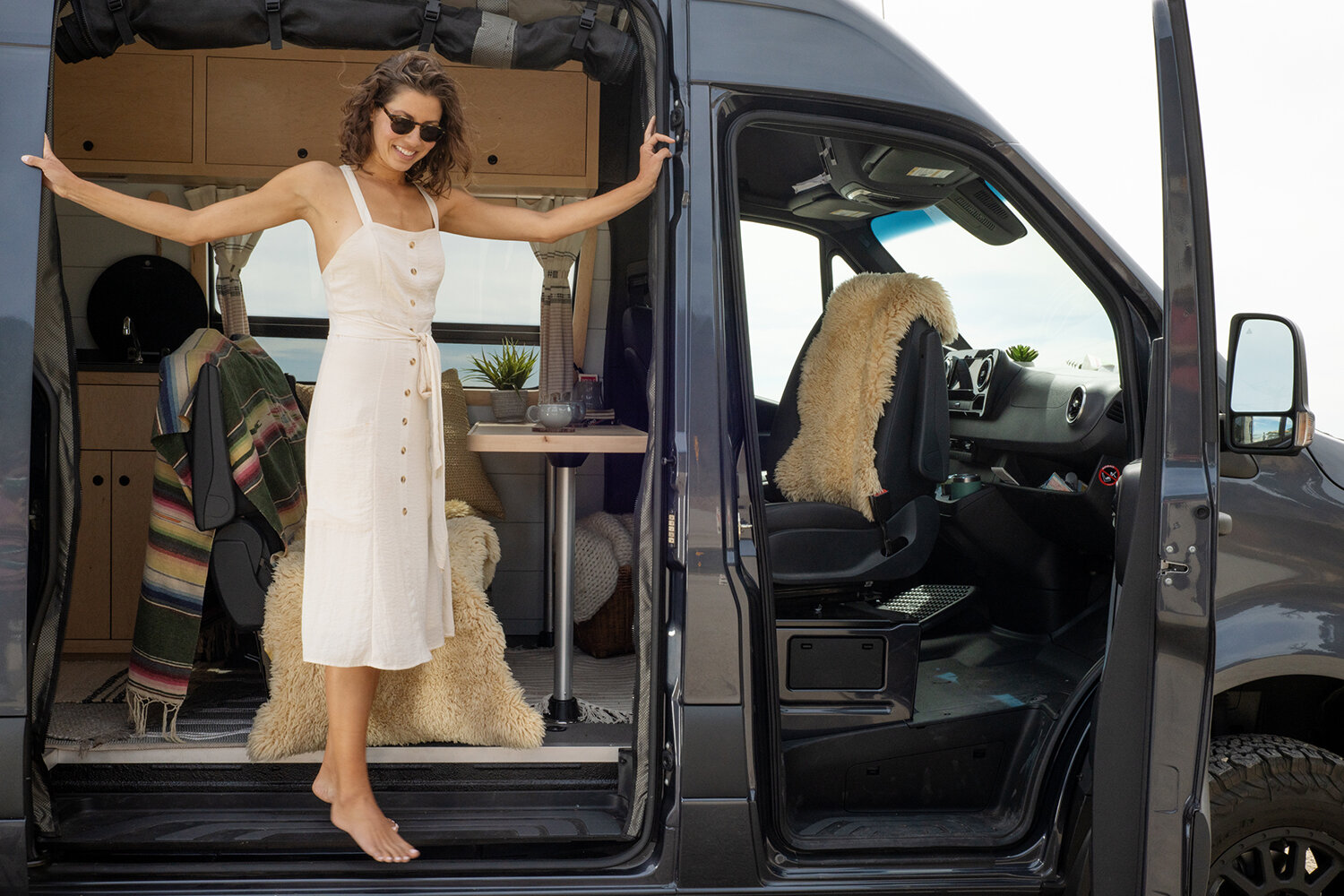Safety Tips for Camper Van Travel
Photo credit: © Muse & Co. Outdoors
Traveling in a camper van is a lot of fun. The perfect blend of freedom, flexibility, and comfort is truly hard to beat. But travel also comes with many hazards, and there is an additional set of potential dangers that are unique to camper van travel. Traveling in a camper van during a global pandemic adds yet another layer of risk to the equation!
Don’t freak out and cancel your plans quite yet, though–there are some simple things that you can do to travel more safely in your Sprinter van. In this article, we’ll break down some of our favorite camper van safety tips, including safe COVID-19 travel advice, how to pick safe spots to sleep, and what to bring along when you camp off-grid.
Camper Van Travel During the COVID-19 Pandemic
At the time of writing this article, the COVID-19 pandemic is still raging out of control in the U.S., with a new record high in daily deaths being recorded just yesterday. Hopefully, by the time you’re reading this, the situation is much more under control! But since we are likely to be living with this virus, in one capacity or another, for some time yet to come, it’s a good idea to know how to travel safely during a pandemic.
The good news is that traveling in a Sprinter camper van is one of the safest ways to hit the road during the pandemic. By nature, a camper van is like your own little isolation pod, complete with everything you need to be self-sufficient. Still, following these simple tips and guidelines help you further reduce your risk of contracting or spreading the virus:
Follow local guidelines and restrictions. First and foremost, you should always follow the current COVID-related guidelines and restrictions that are in place in your area of travel. This includes wherever you are coming from, as well as your destination(s). Local COVID restrictions are put in place by officials based on science and current infection rates, and they exist to protect you and others.
Minimize stops. Minimizing your stops is a critical part of COVID-safe travel. Aim to get all your groceries and supplies in one trip, before you leave. If you have to stop for gas, be sure to sanitize your hands before and after touching the pump. Minimizing the number of stops you take as you travel goes a long way towards protecting both you and the communities you pass through.
Make plans, and backup plans. Now is a good time to make a plan for where you will sleep each night and what activities you will engage in during the days of your trip. Try to choose areas that are less crowded. If you’re planning to camp off-grid somewhere that reservations aren’t possible, make sure you have a backup plan in place. That way, you can avoid overcrowding an area if there are already people camping there. The same goes for daytime activities where social distancing isn’t possible.
How to Find Safe Places to Park in Your Camper Van
Although camper vans provide more of a barrier between you and the outside world than tents do, some travelers are apprehensive about sleeping in a vehicle. Moreover, camper van travelers often find themselves camping out in unorthodox areas. Few vanlifers haven’t spent nights at Walmart parking lots close to the interstate, or highway pullouts just a stone’s throw from the morning surf spot.
The ability to camp comfortably in these areas is one of the major benefits of #vanlife. But it’s important to pick wisely and follow these basic precautions when choosing a place to settle down for the night in your Sprinter van:
Make sure it’s legal. The first thing you should always do when choosing an impromptu place to sleep for the night in your van is to make sure that it’s legal to camp there. For example, some (but not all) stores allow people to sleep in their vehicles in the parking lot. Walmart is famous among the camper van community as a go-to stop when you need a few hours of rest during a long drive. Similarly, some states and cities have regulations regarding sleeping in a vehicle. To avoid an unwanted knock on your van by police in the middle of the night, always heed these regulations.
Choose well-lit areas with an exit route. Well-lit areas are a better bet for safety. Anyone with bad intentions towards you or your property is much less likely to attempt to break into your van in a well-lit area. It’s also important to choose spots where driving away is straightforward. In a worst-case scenario where you feel unsafe in your spot, an easy exit strategy could make a big difference.
Don’t make yourself an easy target. The majority of van break-ins happen when crooks try to make a quick steal of a few valuable items. There are a couple of things you can do to minimize the chances of a break-in. First, always store valuables out of plain sight. Some full-time #vanlifers actually keep a safe in their rig. While this isn’t necessary for all travelers, it’s still a good idea to keep valuables well-hidden to discourage break-ins. Next, if you’re in a heavily populated area and you’re concerned about a break-in, you shouldn’t let potential thieves get a glimpse of what your van’s interior looks like. Exiting out the front doors, rather than the slider, is usually safer. Use window coverings or a curtain to block the view from outside. Most Sprinter vans without a view of the interior will look like just another cargo van to the average passerby.
Off-Grid Camper Van Safety Supplies
The ability to camp off-grid in remote areas is one of the unique benefits of camper van travel. But camping off-grid comes with a distinct set of risks, as well. Traveling several miles down remote dirt roads, often without cell phone service, means you’ll need to be extra prepared should something happen. With a few pieces of essential gear, off-grid camping in a Sprinter van can be safe as well as fun.
Photo credit: Spring Wheeling 018 by Powhusku is licensed under CC BY-SA 2.0
Vehicle Recovery Gear
If you’re camping in a really remote area, getting your van stuck just isn’t an option. Doing so could mean being stranded miles into the backcountry without cell service. That’s why some basic vehicle recovery gear is a must-have for anyone camping off-grid in their van. Bringing these items along should help you to stay out of trouble on dirt roads:
Traction boards: Traction boards can get you out of sticky situations on dirt roads quickly and easily. These super-strong boards made of high-strength plastic are designed to get you un-stuck if your tires are spinning out in areas of mud, sand, or loose dirt. To use them, you simply stick them under two powered wheels and hit the gas. Once you’re on more stable ground, you can retrieve them on foot.
Air compressor: An onboard air compressor allows you to inflate and deflate your van’s tires with ease. In areas of suboptimal traction, such as on sand, mud, or even snow, deflating your tires somewhat can greatly improve your traction. Of course, it’s bad for the vehicle and the tires to continue driving like this for long distances, so an onboard air compressor allows you to reinflate your tires when you are through the area of poor traction.
Camper Van First Aid Kit
A first aid kit is something you hope to never have to use. Still, in case of an emergency, it’s an essential thing to bring along during camper van travel. Many of the pre-packaged first aid kits you can buy in a drug store don’t include the true essentials you could need in an emergency situation. We recommend building your own camper van first aid kit, including the following supplies:
Antiseptic wound cleaner
Gauze
Non-stick gauze pads
Alcohol swabs
Adhesive tape
Antibiotic ointment
Hydrocortisone cream
Liquid bandage
Ice packs
Liquid Saline SOlution
Ace bandage
Surgical gloves
Splints
NSAIDS (Nonsteroidal anti-inflammatory drugs) i.e. ibuprofen, aspirin, etc.
Bottle of purified water
First aid manual
Surgical scissors
Pocket knife
Sewing needle with heavy-duty thread
Eye wash cup
Tweezers
Safety pins
As long as you bring along the right supplies, off-grid travel in a camper van can be worry-free. Keep these safety tips in mind during your next trip in your Sprinter conversion van. Camper van travel is meant to be fun and relaxing, and by taking these small precautions, you can enjoy your trip with peace of mind. Stay safe! Your friends at Muse & Co. Outdoors.
Photo credit: © Muse & Co. Outdoors



